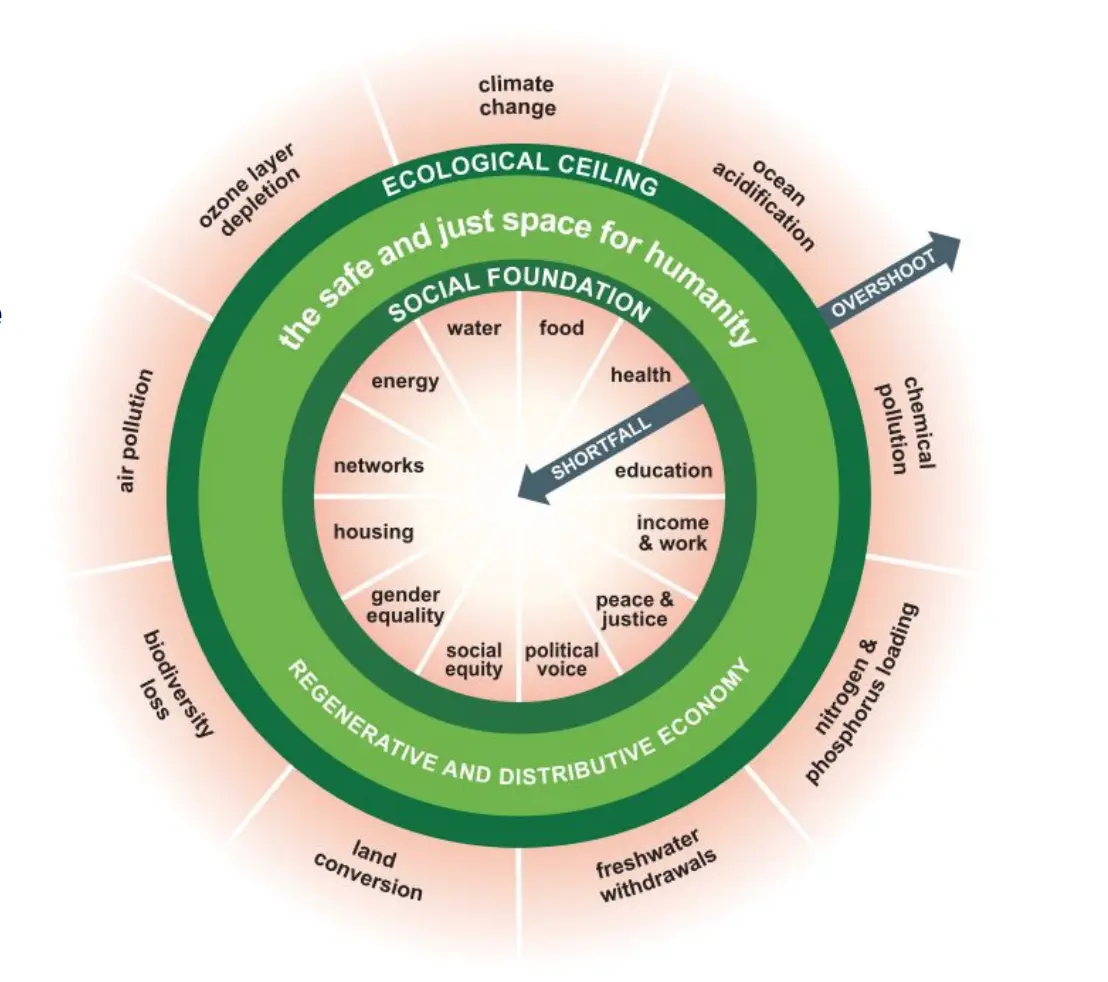Welcome to Doughnut Economics
Hi everyone, apologies for not creating this welcome post sooner but welcome to the Doughnut Economics community on lemmy. This is a place to discuss concepts, tools, stories and work being done to build the Doughnut Economy of the 21'st century.
What is Doughnut Economics?
Doughnut Economics is an Economic framework developed by Prof. Kate Raworth in her book "Doughnut Economics: 7 Ways to Think like a 21's Century Economist". The goal of Doughnut Economics is to move the world away from pursuing GDP growth at all costs and to instead to "meet the needs of all within the limits of the earth" and "create a safe and just space for humanity". The key to that is the Doughnut

The Doughnut is a new goal for humanity. It comprises an inner ring of "Social Foundations" which are the basic needs every human being needs to live a decent life which are based on the U.N Sustainable Development goals. And an outer ring called the "Ecological Ceiling" which are based on the planetary boundaries framework created by The Stockholm Resilience Center.
The social foundations include:
- Water
- Food
- Health
- Education
- Income & Work
- Peace & Justice
- Political Voice
- Social Equity
- Gender Equity
- Housing
- Networks
- Energy
While the Ecological Ceiling include:
- Climate Change
- Ocean Acidification
- Chemical Pollution
- Nitrogen & Phosphorus Loading
- Freshwater Withdraws
- Land Conversion
- Biodiversity Loss
- Air Pollution
- Ozone Layer Depletion
The goal of the Doughnut is to provide enough resources to everyone to meet all the Social Foundations without blowing past the Ecological Ceiling.
Is this "Communism", "Socialism", "Marxism", "Capitalism", some other -ism?
Yes and No. Doughnut Economics attempts to redirect the economic conversation away from the economic concepts and ideas that ruled economic discourse during the 20th Century and instead have a new conversation on the goals and challenges for humanity in the 21'st century. The 20th century neo-liberal story about economics came with some axioms about the market and the people/players in them
- The Market, which is efficient - so give it free rein
- Business, which is innovative - so let it lead
- Finance, which is infallible - so trust in its ways
- Trade, which is win-win - so open your borders
- The State, which is incompetent - so don't let it meddle
- The Household, which is domestic - so leave it to the women
- The Commons, which are tragic - so sell them off
- Society, which is non-existent - so ignore it
- Earth, which is inexhaustible - so take all you want
These ideas and concepts drove economic policy and objectives during the 20th century. For humanity to survive in the 21'st century Doughnut Economics proposes a new story to be told
- Earth, which is life-giving - so respect its boundaries
- Society, which is foundational - so nurture its connections
- The Economy, which is diverse - so support all of its systems
- The Household, which is core - so value its contribution
- The Market, which is powerful - so embed it wisely
- The Commons, which are creative - so unleash their potential
- The State, which is essential - so make it accountable
- Finance, which is in service - so make it serve society
- Business, which is innovative - so give it purpose
- Trade, which is double-edged - so make it fair
- Power, which is pervasive - so check its abuse
With these axioms in mind Doughnut Economics requires us to do several things
- Change the goal from GDP growth to the Doughnut
- See the Big picture of how our economy works and how it must change
- Nurture Human Nature, not just human selfishness and greed but our kindness, creativity, caring and love for each other and the planet.
- Get Savvy with systems not just economic systems but planetary systems, social systems, legal systems. How they work and how they may be improved.
- Design to Distribute. Don't concentrate power/resources but work to evenly and equitably distribute it.
- Create to Regenerate. Don't just make things to be used and disposed of but built to be reused, repurposed or returned back to the earth in a way that regenerates the planet.
- Be Agnostic about Growth. GDP growth is good for helping countries & societies to meet their social foundations but it should not grow so much that it passes the ecological ceilings so be agnostic about it.
Additional Info
I hope we can all contribute, participate and debate in a healthy and respectful manner. For some additional resources on Doughnut Economics I have provided some links to resources from the Doughnut Economics Action Lab(DEAL).